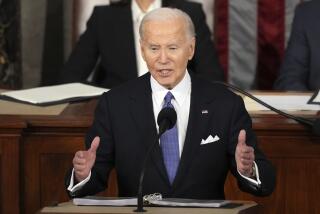Defiant Hussein Urges Iraqis to Stand Firm
NICOSIA, Cyprus — In his first major speech in nearly six months, Iraqi President Saddam Hussein on Saturday sought to close ranks at home and divide the anti-Iraq coalition abroad, appealing specifically to China, Japan and Europe to break away from what he called the Clinton Administration’s “political insanity” toward Iraq.
Hussein also leveled his strongest attack yet against a U.S. Administration that he greeted last January with a hopeful promise of “months of peace.”
Hussein made no specific mention of the continuing showdown between Iraq and U.N. weapons inspectors, which the United States has warned could again make Iraq the target of U.S.-led air strikes, but he indicated that Iraq is in no mood for compromise.
In an address that blared from loudspeakers throughout Baghdad and television sets nationwide, punctuated by two 21-gun salutes, the Iraqi president declared, “The Iraqi people will bow to no one but God and will reject treachery, deceit and threats.”
Hussein told his people that the U.N. trade embargo that has crippled their economy and isolated their nation for nearly three years “cannot end if (the Iraqis) are to beg, show weakness or dependence on any of the powers of shame, evil and crime”--a phrase that one official interpreted as a signal that the regime has no intention of backing down on its recent refusal to permit U.N. monitoring at two key missile-testing sites south of Baghdad.
The address marked the 25th anniversary of the revolution that overthrew Iraq’s monarchy and brought Hussein’s Arab Baath Socialist Party to power. The national holiday apparently caused the postponement until today of a scheduled Saturday evening round of talks aimed at defusing the crisis between Iraqi officials and Rolf Ekeus, the head of the U.N. Special Commission in charge of destroying Iraq’s weapons of mass destruction.
Ekeus arrived in Baghdad last Thursday. He hopes to convince the Iraqi leadership that full compliance with the resolutions that ended the 1991 U.S.-led war to free Kuwait from Iraqi occupation is the only way to end Iraq’s continuing economic isolation.
Ekeus’ visit was authorized by the U.N. Security Council after Iraq’s refusal to permit surveillance cameras or temporary seals on the missile-testing facilities brought threats of military action from the Clinton Administration, which launched a cruise-missile strike on a Baghdad intelligence compound June 27 to retaliate for an alleged Iraqi plot to assassinate former President George Bush.
More to Read
Sign up for Essential California
The most important California stories and recommendations in your inbox every morning.
You may occasionally receive promotional content from the Los Angeles Times.










